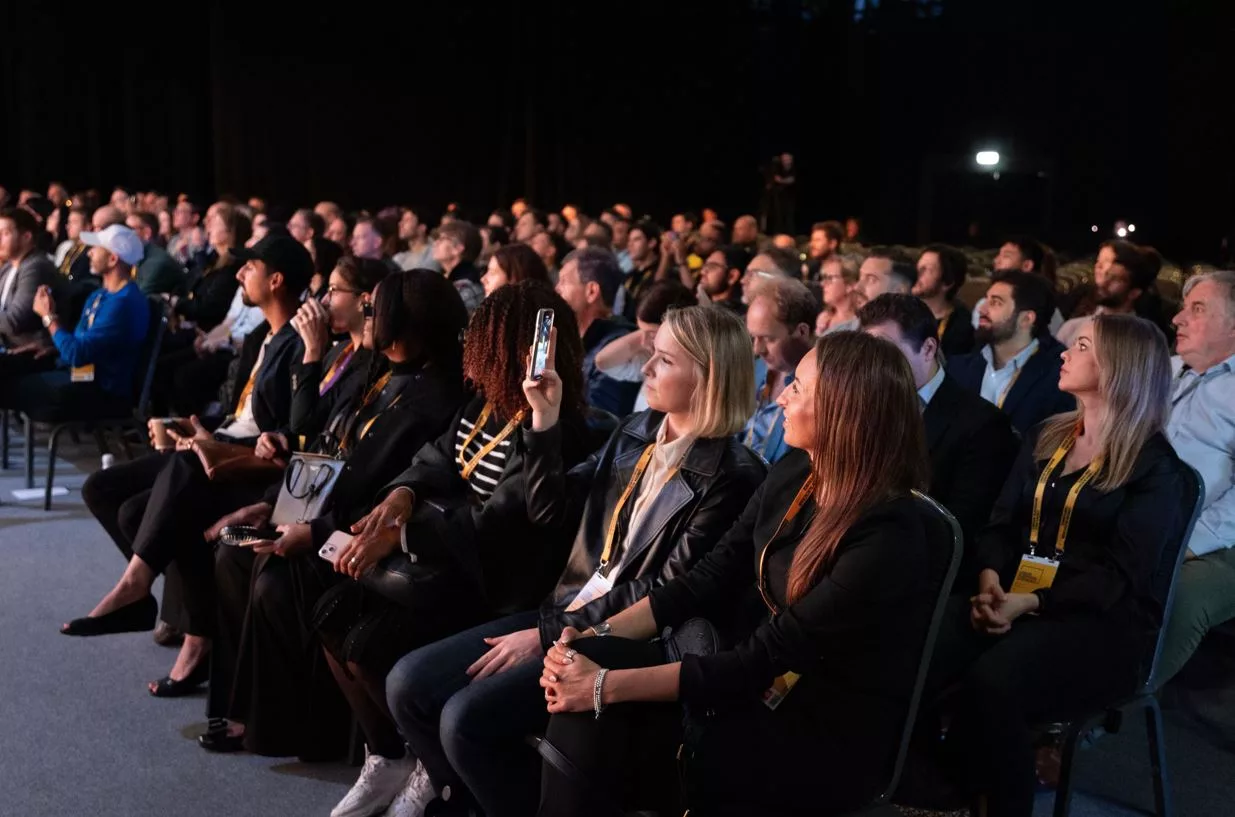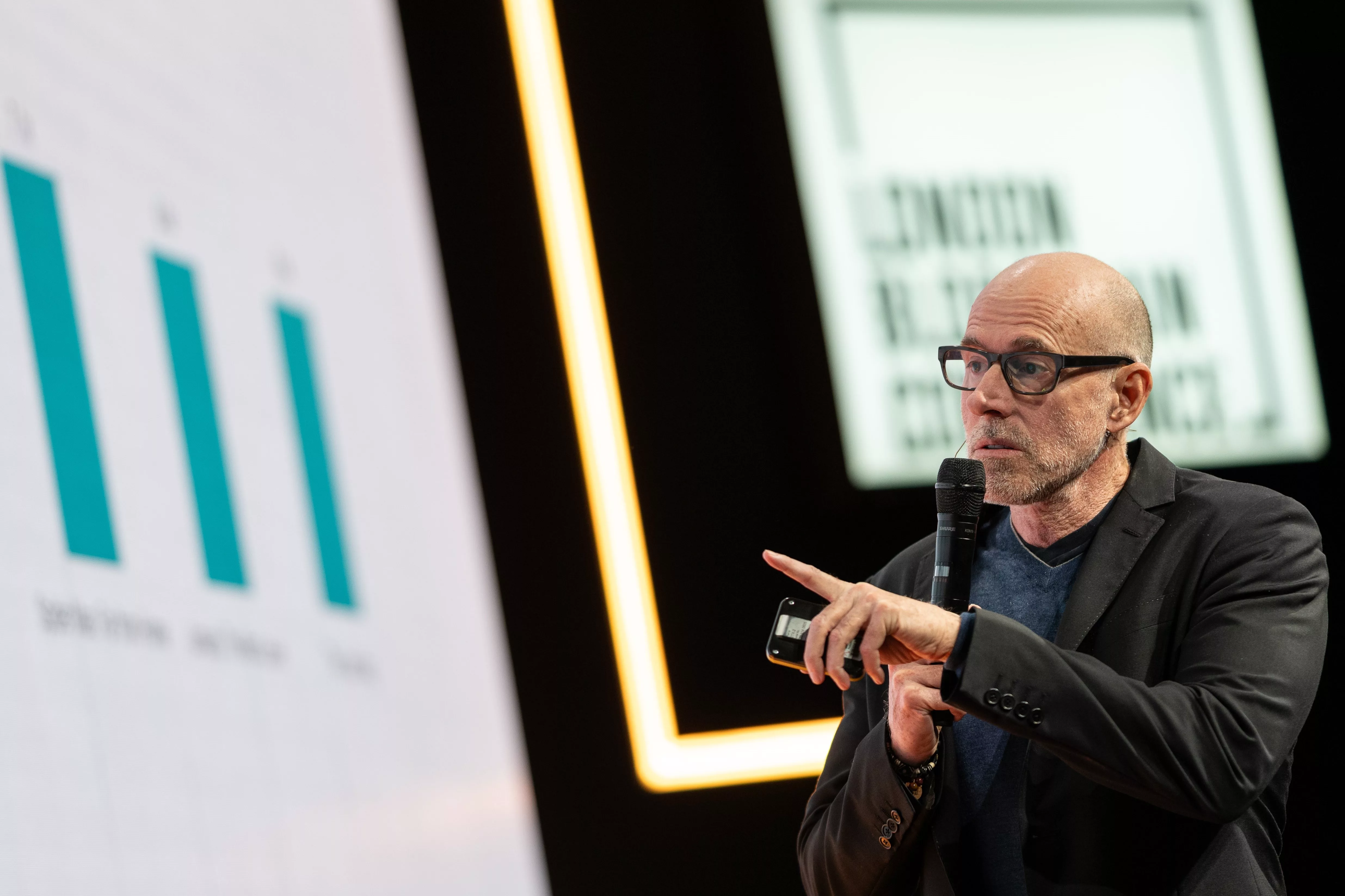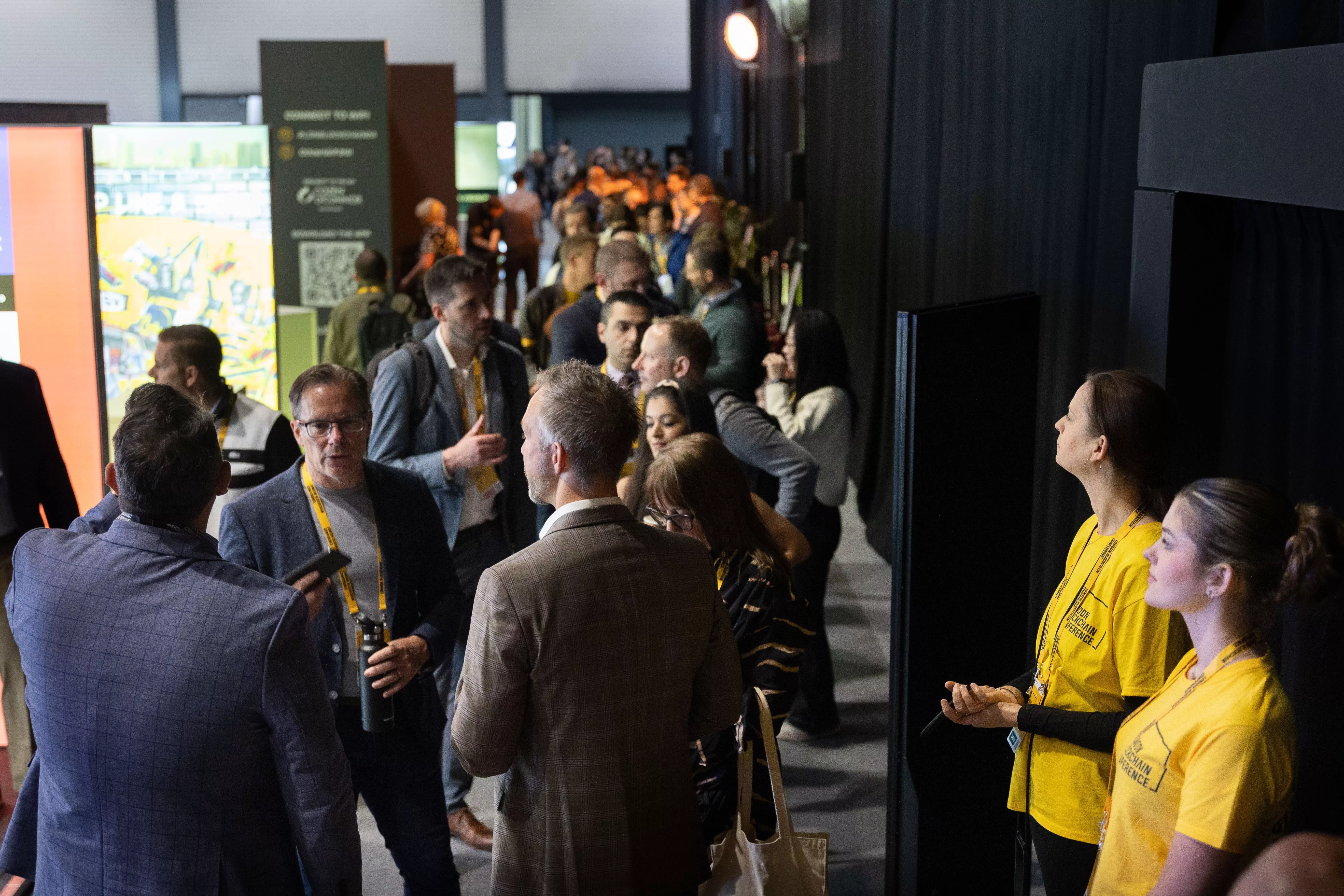|
Getting your Trinity Audio player ready...
|
On May 23, the three-day London Blockchain Conference 2024 drew to a close, leaving delegates with business cards to sort, ideas to develop, and much to digest—not least gourmet Scandi hotdogs.
The annual conference brought together a smorgasbord of businesses, academics, developers, innovators, and commentors, along with a healthy side of interested publics and blockchain enthusiasts, to discuss, learn, and connect all things blockchain, fintech, artificial intelligence (AI), and regulation.
The setting was the ExCel centre at the Royal Docks, sitting on the banks of the Thames, which runs inexorably through the heart of London, one of the finance centers of the world. The locational symbolism is almost too delicious for a conference focused on the unstoppable onward march of tech innovation.

Arriving at the ExCel plunges you into a seemingly endless building full of vast halls, one of which housed the London Blockchain Conference 2024, where the echoes of frenetic chat and meet-and-greet schmoozing gave the impression of being trapped in a nerdy beehive.
Three stages hosted an array of talks, panels, and presentations revolving around enterprise blockchain and AI, beginning with a barnstorming roundup of market trends from the conference’s opening keynote by Scott Galloway.
DAY 1—Market trends to blockchain audited AI
Kicking off day one, Galloway, a professor of marketing at the prestigious Stern School of Business at NYU, was at times hilarious, shocking, and concerning in equal measure. His keynote veered from a searing indictment of Hollywood economics and the viewing habits of the under-25s to worrying stats about the pervasive influence of the Chinese-owned TikTok.
Particularly known for his market predictions, Galloway told a raptured audience, with his trademark deadpan delivery, that the way to make money is in “time machines”—by which he meant tech that saves people time. He pointed to AI as the most prominent example of a contemporary time machine, shaving hours off the working days of any number of occupations (for better or worse).

He rounded off his conference opener with his number one prediction for the key investment of 2024, GLP-1 drugs—e.g. the trending weight-loss drug Ozempic.
“The one thing we share as Americans is that we’re really fat,” said Galloway, who suggested that GLP-1 drugs will eventually be used to treat all addictions, and companies involved in GLP-1 “are going to kick the shit out of companies involved in alcohol production.”
Returning to tech briefly, he also said that “AI is corporate Ozempic,” in other words, companies are “turning off the signal” that they need to have more people to do more work, and instead are using AI.
Galloway ended his sermon on the market with a Q&A, which produced one of the more profound moments, worth keeping in mind.
Asked if he had children what he would teach them, Galloway eschewed the go-to answers of yesteryear like “Mandarin” and “computer science,” which he said were not as necessary and useful as people make out, instead opting for “storytelling.”
The art of being able to transmit information to others, make them interested and compelled by what you’re saying, or in the case of the market, what you’re selling.

At a conference centered around blockchain technology, which Galloway said 99% of people don’t understand, perhaps this message was particularly relevant for the assembled attendees.
This was possibly the most memorable speech of London Blockchain Conference 2024 Day 1, but there were plenty more highlights, including an announcement from nChain’s Chief Science Officer, Owen Vaughan, of the “Universal Blockchain Asset,” a token that can be issued on one blockchain that isn’t restricted to that blockchain; and a panel on the future of cybersecurity, which explored the dueling concepts of ‘blockchain for security’ and ‘security for the blockchain.’
The conference’s first day was bookended by two fascinating keynotes, but more different they couldn’t have been. While Galloway’s deadpan comedy set focused on investment trends and prediction, particularly in the U.S. context, Dr. Scott Zoldi finished the day by schooling the crowd on the importance of responsible AI.
Specifically, Zoldi made the persuasive case that “now, more than ever, it’s imperative we establish trust in AI governance.” This included making AI auditable through the use of the blockchain.
Nicely marrying London Blockchain Conference’s two core tech foci together, Zoldi explained how his team at data analytics company FICO utilizes the immutability of the blockchain to record everything from the inception of an AI model, through testing, to release—creating the foundation for increased trust in the process from customer and regulators.
DAY 2—A Dragon’s tips for success to digital asset recovery
The miserable London rain that accompanied London Blockchain Conference attendees home after Day 1’s post-conference meet-and-greet session—lubricated by many a bottle of wine and beer—refused to let up as they crowded back in for Day 2.
However, enthusiasm seemed undampened as delegates cued out the door for the ‘secret keynote’ that opened another day of talks, panels and presentations. And the surprise speaker was not a disappointment.
British entrepreneur, podcaster and ‘TV dragon’, Steven Bartlett was as full of insightful and inspiring business tips as he was of celebrity anecdotes.
Key takeaways from the creator of the popular podcast series ‘The Diary of a CEO,’ included the importance of “hiring” in success, making sure employees see and feel progress, and that Manchester United will probably be ok under their new leadership.
After Bartlett’s thought-provoking opener, in between cashing in Bitcoin to buy fancy hotdogs and fried chicken burgers from the conference’s resident food trucks, delegates worked off the calories by stretching their little grey cells in day two’s other talks.
Highlights included an early session on ‘exploring the future of identity, contracts, and assets on the MetaNet,’ which emphasized that interoperability is key, while the day’s closing keynote presentation saw Tibor Merey, managing director and partner at Boston Consulting Group, examine what separates the failed startups and the unicorns of the digital asset space.
Perhaps for understandable reasons, one of the most subscribed talks of the day was a discussion panel on digital asset recovery, which packed out the conference’s ‘Insights’ room in the afternoon.
The conversation began by outlining the problem at hand, namely the lamentably large number of digital assets lost and stolen each year, and the lack of expertise that law enforcement around the globe has in dealing with the issue.

However, the overall tone was one of optimism and hope, as the panel, made up of experts in digital asset recovery—Marcin Zarakowski (CEO of Token Recovery), Federico Paesano (Training and Investigation Lead at Crystal Intelligence), Lex Fisun (CEO at GlobalLedger.io), Roman Bieda (Head of Investigations at Token Recovery) and Matthew Denyer (Chief Technology Officer at Asset Reality)—explored how “lost” assets can, and are, recovered through tracing, freezing and reassigning.
The lively and compelling discussion did touch on several challenges, including the reticence of some digital asset miners to act “on the user’s side” when it comes to reassigning coins, and of course, the looming shadow of digital asset “mixer” platforms that obfuscate the origin of coins, making it easier to hide stolen funds and harder to recover them.
But, ending on a positive note, Paesano, who in a former life also worked as an investigator with the Italian financial police, told the eager audience that the digital asset recovery situation is slowly but surely changing for the better:
“The entire ecosystem is working towards this goal. Awareness in users and law enforcement is increasing. Apps are getting better, and from a regulatory point of view there are frameworks and international cooperation… the percentage of illicit activity on the blockchain is decreasing, we’re getting better.”
DAY 3—On-ramping HNWIs to Metaverse certainty
Despite two days’ worth of post-event, drink-fueled schmoozing, hangovers seemed in short supply—at least visibly—and attendees’ energy for the final day of discussions and talks remained high.
One of the morning’s most interesting presentations came from Andrew Bellingham, Head of Trade at blockchain payment service Coinify, who outlined how the industry can attract more “non-crypto native” high-net-worth individuals (HNWIs).
Preaching to a choir of blockchain businesses seeking investment and budding investors, some of whom were likely HNWIs themselves—judging by their pristine suits and shiny watches—Bellingham explained that this valuable investor group is “often overwhelmed by the asset class… Essentially they don’t know where to start, it’s important we teach them how to navigate.”
He also noted that amongst their principal requirements was the need for “full regulatory compliance”—something which has been a theme of LBC 2024.

Elsewhere, the day saw a panel discussion on stablecoins, specifically how they can deliver more efficient payments and provide the foundation for innovative payment use cases, featuring a diverse roster of speakers, including Reginald Tumusiime (President of the Blockchain Association of Uganda), Sebastian Ploetzeneder (Senior Strategy Manager and Public Affairs Director U.K. at nChain) and Harbind Likhari (VP Trading and Exchange Services at RockWallet).
As the event wound to a close, the final presentation on the ‘Spotlight’ stage proved another memorable moment.
Dr. Daniel Diemers, co-founder and board member of the Swiss Metaverse Association, introduced the organization’s ‘Regulatory Position Paper,’ and outlined their push for “positive” Metaverse regulation in Switzerland, and beyond.
As well as explaining how the paper, titled ‘Creating certainty for the Metaverse,’ took a leaf out of the playbook used by blockchain advocates in Switzerland, including Diemers himself, to get progressive digital asset and blockchain regulation pushed through the Swiss parliament, he had some interesting, and relevant, things to say on communication in tech spaces.
In drafting the paper, explained Diemers that the Swiss Metaverse Association made sure to make it “lean, understandable, clear language.” A point clearly aimed at the many blockchain enthusiasts in the audience, as something of a theme to come out of the three-day conference has been the many discussions on how the industry might have a PR and communication problem, when it comes to investors and regulators.
Diemers rounded off his presentation by telling the attendees that “digital assets will be an elementary part of the metaverse… we hope to see this development tie many things together, including AI and blockchain. There are so many things that can happen, let’s let them happen in a positive, regulated way”—another popular opinion at the London Blockchain Conference 2024.
Final thoughts
As the dust settles on the ExCel centre’s dramatically curtained stages—huge black drapes reminiscent of a performance art event— perhaps the key takeaways from this year’s London Blockchain Conference seem to be the need and desire for solid regulation from lawmakers and compliance from the industry, as well as the need for improved communication from enterprises and advocates in the space.
These aside, if the innovative ideas and bright minds circulating at the event were anything to go by, many of the pieces appear to be in place for the industry to thrive and progress—something to look out for at London Blockchain Conference 2025.
Watch: Day One Summary at #LDNBlockchain24
Watch: Day Two Highlights at #LDNBlockchain24

 04-17-2025
04-17-2025 





